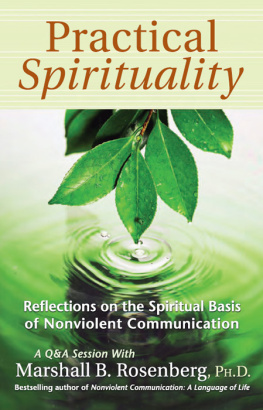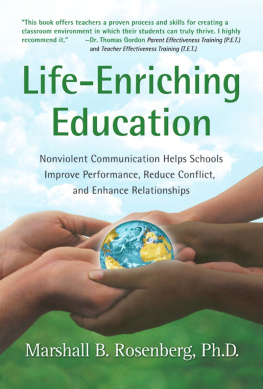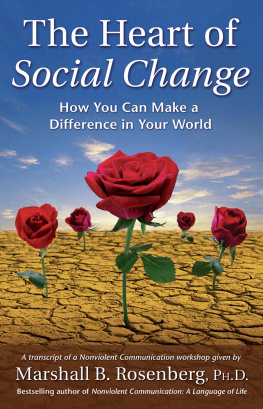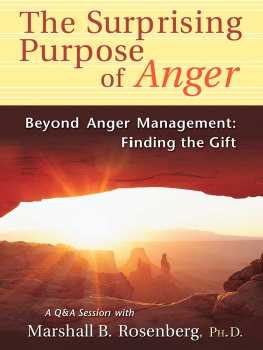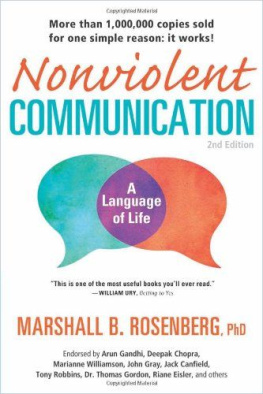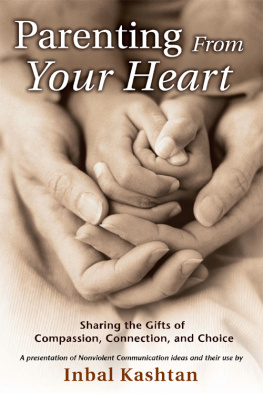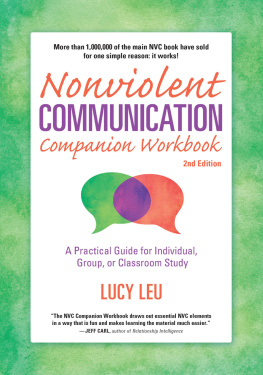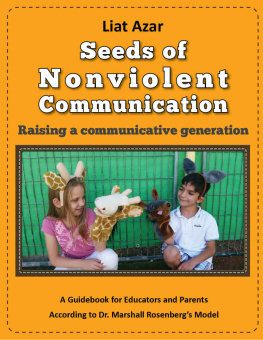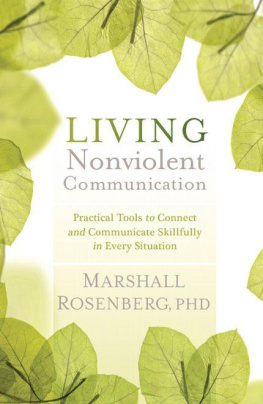P.O. Box 231129, Encinitas, CA 92023-1129
For additional information:
Center for Nonviolent Communication
5600 San Francisco Rd. NE Suite A, Albuquerque, NM 87109
Ph: 505-244-4041 Fax: 505-247-0414 Email:
Practical Spirituality
Reflections on the Spiritual Basis of Nonviolent Communication
ISBN: 978-1-892005-14-4
Copyright 2004 PuddleDancer Press
Author: Marshall B. Rosenberg, Ph.D.
Editor: Graham Van Dixhorn, Write to Your Market, Inc., www.writetoyourmarket.com
Cover and Interior Design: Lightbourne, Inc., www.lightbourne.com
Cover photograph: www.gettyimages.com
A PuddleDancer Press booklet published by arrangement with CNVC. All rights reserved. No part of this booklet may be reproduced by any mechanical, photographic, or electronic process, or in the form of a photographic recording, nor may it be stored in a retrieval system, transmitted or otherwise copied for public or private use without the written permission of the publisher.
Requests for permission should be addressed to:
PuddleDancer Press
Permissions Dept.
P.O. Box 231129
Encinitas, CA 92023-1129
Fax: 858-759-6967
Contents
Practical Spirituality

A Q&A Session with
Marshall B. Rosenberg, Ph.D.
W henever Marshall Rosenberg speaks about deeply held beliefsspirituality, concepts of God, views of lovetwo themes always emerge: 1) the greatest joy springs from connecting to life by contributing to our own and others well-being, and 2) spirituality and love are more about what we do than what we feel.
People frequently ask Marshall how he got to that place, how he relates to the religious beliefs of others, and what his views mean for the practice of Nonviolent Communication. What follows are excerpts of Marshalls unscripted, verbal responses to queries from media interviewers and workshop participants on the subject of spirituality, the concept of the Divine, the spiritual basis of NVC, and applying NVC values to social change.
Q: How do we connect with the Divine through Nonviolent Communication?
A: I think it is important that people see that spirituality is at the base of Nonviolent Communication, and that they learn the mechanics of the NVC process with that in mind. Its really a spiritual practice that I am trying to show as a way of life. Even though we dont make a point of mentioning this, people get seduced by the practice. Even if they practice NVC as a mechanical technique, they start to experience things between themselves and other people they werent able to experience before. So eventually they come to the spirituality of the process. They begin to see that its more than a communication process and realize its really an attempt to manifest our spirituality. I have tried to integrate the spirituality into the practice of NVC in a way that meets my need not to destroy the beauty of it through abstract philosophizing.
The kind of world Id like to live in will require some rather significant social changes, but the changes that Id like to see happen probably wont happen unless the people working toward them are coming out of a different spirituality than what has led to the predicaments were in now. So, our training is designed to help people make sure that the spirituality thats guiding them is one of their own choosing and not one theyve internalized by the culture. And that they proceed in creating social change out of that spirituality.
Q: What does God mean to you?
A: I need a way to think of God that works for meother words or ways to look at this beauty, this powerful energyand so my name for God is Beloved Divine Energy. For a while it was just Divine Energy but then I was reading some of the Eastern religions, and Eastern poets, and I loved how they had this personal, loving connection with this Energy. And I found that it added to my life to call it Beloved Divine Energy. To me this Beloved Divine Energy is Life, connection to life.
Q: What is your favorite way of knowing Beloved Divine Energy?
A: It is how I connect with human beings. I know Beloved Divine Energy by connecting with human beings in a certain way. I not only see Divine Energy, I taste Divine Energy, I feel Divine Energy, and I am Divine Energy. Im connected with Beloved Divine Energy when I connect with human beings in this way. Then God is very alive for me.
Q: What religious beliefs, teachings, or writings have had the greatest influence on you?
A: Its hard for me to say which of the various religions on the planet have had the most impact on me. Probably Buddhism as much as any. I like so much of what I understand the Buddha or the people who quoted the Buddha to be saying. For example, the Buddha makes it very clear: Dont get addicted to your strategies, your requests, or your desires. Thats a very important part of our training: to not mix real human needs with the way weve been educated to get those needs met. So, be careful to not get your strategies mixed up with your needs. We dont need a new car, for example. Some people may choose a new car as a strategy for meeting a need for reliability or peace of mind, but youve got to watch out, because society can trick you into thinking its the new car that you really need. This part of our training is very much in harmony with my understanding of the Buddha.
Almost all of the religions and mythologies Ive studied say a very similar message, one that Joseph Campbell, the mythologist, summarizes in some of his work: Dont do anything that isnt play. And what they mean by play is willingly contributing to life. So, dont do anything to avoid punishment; dont do anything for rewards; dont do anything out of guilt, shame, and the vicious concepts of duty and obligation. What you do will be play when you can see how it enriches life. I get that message from my understanding not only of the Buddha, but also from what I have learned about Islam, Christianity, and Judaism. I think its a natural language. Do that which contributes to life.
Q: Doesnt the influence of religion and spirituality promote passivity, or an opiate of the masses effect?
A: Im very worried about any spirituality that allows us to just sit comfortably in the world and say, But I am helping the world, the energy alone coming from me is going to create social change. Rather, I trust a spirituality that leads people to go forward and transform the world, that doesnt just sit there with this beautiful image of radiating energy. I want to see that energy reflected in the persons actions as they go out and make things happen. Its something you do, a practical spirituality.
Q: So Nonviolent Communication evolved in part from spiritual origins?
A: Nonviolent Communication evolved from my attempt to get conscious about Beloved Divine Energy and how to connect with it. I was dissatisfied with input from my chosen field of clinical psychology because it was and is pathology-based and I didnt like its language. It didnt give me a view of the beauty of human beings. So, after I got my degree I decided to go more in the direction of Carl Rogers and Abraham Maslow.
I decided to ask myself the scary questions, What are we and what are we meant to be? I found that there was very little written about this in psychology. So I took a crash course in comparative religion because I saw they dealt more with this question. And this word love kept coming up in each of them.

